I am writing a C# program that uses Microsoft Scientific Data-Set to read NetCDF files.
using System;
using System.IO;
using sds = Microsoft.Research.Science.Data;
using Microsoft.Research.Science.Data.Imperative;
namespace NetCDFConsoleApp
{
class Program
{
static void Main(string[] args)
{
// Gets dataset from file.
var dataset = sds.DataSet.Open("E:\\Temp\\test.nc?openMode=readOnly");
// Get the starting DateTime from the meta data.
string dt = (string)dataset.Metadata["START_DATE"];
//load dataset into array
Single[,,] dataValues = dataset.GetData<float[,,]>("ACPR");
//Get DateTime from Metadata fields.
DateTime dt2 = DateTime.ParseExact(dt, "yyyy-MM-dd_HH:mm:ss", null);
// Latitude grid ranges from = 0 to 215; East Cape is ~ 125-144
for (int iLatitude = 137; iLatitude < 138; iLatitude++)
{
//Longitude ranges from 0 to 165; East Cape is ~ 125-150
for (int iLongitude = 133; iLongitude < 134; iLongitude++)
{
//There is normally 85 hours worth of data in a file. But not always...
for (int iTime = 0; iTime < 65; iTime++)
{
// Get each data point
float? thisValue = dataValues[iTime,iLatitude,iLongitude];
//Burp it out to the Console. Increment the datetime while im at it.
Console.WriteLine(dt.ToString() + ',' + dt2.ToString() + ',' + iTime.ToString() + ',' + dt2.AddHours(iTime) );
}
}
}
Console.ReadLine();
}
}
}
The files contain predicted rainfall data over a map grid (X,Y). Each grid reference should have 85 hours worth of data.
E:\temp>sds list test.nc
[2] ACPR of type Single (Time:85) (south_north:213) (west_east:165)
[1] Times of type SByte (Time:85) (DateStrLen:19)
But occasionally they might have less (Say 60-70 hours). When that happens my C# programs fails when importing the data.
var dataset = sds.DataSet.Open("test.nc?openMode=readOnly");
Single[,,] dataValues = dataset.GetData<Single[,,]>("ACPR");
I can reproduce the error with the command line.
Here I can successfully extract hours 60-65 for Grid XY: 125,130. The last Value i have in this file is Time=69.
E:\temp>sds data test.nc ACPR[60:65,125:125,130:130]
[2] ACPR of type Single (Time:85) (south_north:213) (west_east:165)
Name = ACPR
description = ACCUMULATED TOTAL GRID SCALE PRECIPITATION
MemoryOrder = XY
coordinates = XLONG XLAT XTIME
stagger =
FieldType = 104
units = mm
[60,125,130] 13.4926
[61,125,130] 15.24556
[62,125,130] 16.3638
[63,125,130] 17.39618
[64,125,130] 20.00507
[65,125,130] 23.57192
If I try and read past hour 69 I get the following error.
E:\temp>sds data test.nc ACPR[60:70,125:125,130:130]
[2] ACPR of type Single (Time:85) (south_north:213) (west_east:165)
Name = ACPR
description = ACCUMULATED TOTAL GRID SCALE PRECIPITATION
MemoryOrder = XY
coordinates = XLONG XLAT XTIME
stagger =
FieldType = 104
units = mm
Unhandled Exception: System.AccessViolationException: Attempted to read or write protected memory. This is often an indication that other memory is corrupt.
at nc_get_vara_float(Int32 , Int32 , UInt64* , UInt64* , Single* )
at NetCDFInterop.NetCDF.nc_get_vara_float(Int32 ncid, Int32 varid, IntPtr[] start, IntPtr[] count, Single[] data)
at Microsoft.Research.Science.Data.NetCDF4.NetCdfVariable`1.ReadData(Int32[] origin, Int32[] shape)
at sdsutil.Program.PrintData(Variable v, String range, String format)
at sdsutil.Program.DoData(String uri, String[] args)
at sdsutil.Program.Main(String[] args)
E:\temp>
If the file contains the full 85 hours I can request Time 0-100 and it still gives me the 85 values without error.
I am convinced that that issue is NULL/missing data. Is there some way I can specify when importing the data where the variable is not null? or use some of sort try/catch?
Single[,,] dataValues = dataset.GetData<Single[,,]>("ACPR")>> where it's not blank thanks. ;
Edit: I am beginning to suspect that the file isn't formed correctly. Using the SDS viewer The meta data for a good file vs a bad look like this;
Yet the command line shows the meta data as being the same for both.
E:\temp>sds good.nc
[2] ACPR of type Single (Time:85) (south_north:213) (west_east:165)
[1] Times of type SByte (Time:85) (DateStrLen:19)
E:\temp>sds bad.nc
[2] ACPR of type Single (Time:85) (south_north:213) (west_east:165)
[1] Times of type SByte (Time:85) (DateStrLen:19)
E:\temp>

